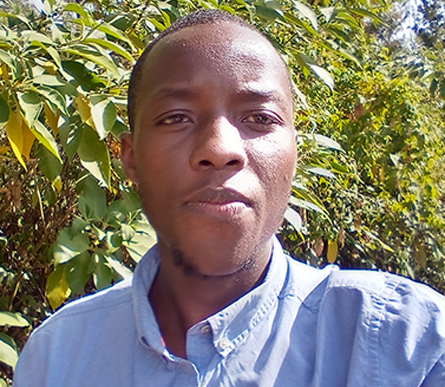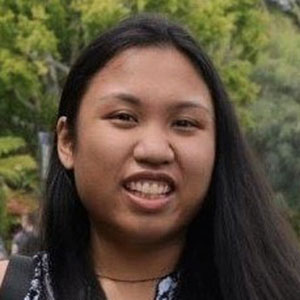
Seeing the molecular beauty of life
When Collins Maina was in secondary school in Kenya, a genetics class piqued his interest in science. He found especially fascinating how certain mutations can be disastrous to the well-being of organisms. And when he took his national exams, he was placed into a biochemistry program, which coincidentally turned out to be a good move for him.

from South Eastern Kenya University in November.
Maina attended South Eastern Kenya University, where he earned his bachelor’s degree in biochemistry and molecular biology in November. He said two particularly memorable classes were Biochemistry of Tumors and Biochemical Techniques and Instrumentation.
Not only were these classes interesting, he said, but he also was able to apply what he learned to his own life situation. Learning about the molecular and cellular bases of tumors helped him and his family when his grandfather developed prostate cancer.
“I remember I was the go-to guy for the family when they wanted to sort of analyze and translate the pathologist’s reports,” he said.
Learning about laboratory techniques in biochemistry was a highlight for Maina because of the physics involved. He was also able to carry and apply some of this knowledge to his career in industry as a medical representative.
In general, Maina said, biochemistry has helped him better understand what life is and how complex it is at the molecular level.
“It’s really fun knowing very well that beyond what you see in a person, you see there are a couple of three-letter sequences (codons) that determine who you are, determine the personality, determine so many things in your life — how a mishap in the placement of an amino acid, how a molecule that lacks the right conformation can have very detrimental effects on an organism,” he said. “At the basic level they are nothing more than molecules, very beautiful molecules.”
Maina values how relatable biochemistry is to real life. “If I don’t watch my health currently, I’m expecting to develop osteoporosis as I get into my 40s,” he said. “And so, it’s like reading the future.”
While applying to postgraduate programs and reading extensively about various areas of research, Maina has developed a passion for molecular microbiology and is particularly interested in quorum sensing, which involves responding to cell population density via gene regulation. He plans to continue his studies by earning a Master of Science degree, preferably in Canada, the United States, Scotland or New Zealand. He easily excelled in his undergraduate courses, but the high cost of and limited access to good schools make this goal quite difficult. Few research jobs are available in Kenya. Still, he remains hopeful.
Eventually, Maina said, he sees himself completing a Ph.D. program, doing a lot of research and retiring as a lecturer.
“I have so many questions I think I need to answer,” he said.
Enjoy reading ASBMB Today?
Become a member to receive the print edition four times a year and the digital edition monthly.
Learn moreFeatured jobs
from the ASBMB career center
Get the latest from ASBMB Today
Enter your email address, and we’ll send you a weekly email with recent articles, interviews and more.
Latest in People
People highlights or most popular articles

Simcox wins SACNAS mentorship award
She was recognized for her sustained excellence in mentorship and was honored at SACNAS’ 2025 National Conference.

From humble beginnings to unlocking lysosomal secrets
Monther Abu–Remaileh will receive the ASBMB’s 2026 Walter A. Shaw Young Investigator Award in Lipid Research at the ASBMB Annual Meeting, March 7-10 in Washington, D.C.

Chemistry meets biology to thwart parasites
Margaret Phillips will receive the Alice and C. C. Wang Award in Molecular Parasitology at the ASBMB Annual Meeting, March 7-10 in Washington, D.C.

ASBMB announces 2026 JBC/Tabor awardees
The seven awardees are first authors of outstanding papers published in 2025 in the Journal of Biological Chemistry.

Decoding how bacteria flip host’s molecular switches
Kim Orth will receive the Earl and Thressa Stadtman Distinguished Scientists Award at the ASBMB Annual Meeting, March 7–10, just outside of Washington, D.C.

Thiam elected to EMBO
He was recognized during the EMBO Members’ Meeting in Heidelberg, Germany, in October.

